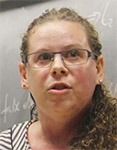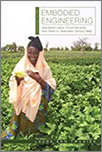Laura Ann Twagira’s (Mali) EMBODIED ENGINEERING — finalist for award
Finalist for
the 2022 African Studies Association
Best Book Prize
Steve Scarpa | The Wesleyan Connection

Laura Ann Twagira (Mali 2000-01)
Associate history professor Laura Ann Twagira’s (Mali 2000-01) book begins with a song – Malian women sing and boast about the quality of their cuisine. From that domestic moment, Twagira found the keys to a technological revolution.
“Women brag and praise each other. They make food that everyone enjoys and that enlivens life. To do that, they need a set of key technological skills,” she said.
Embodied Engineering: Gendered Labor, Food Security, and Taste in Twentieth-Century Mali was named a finalist for the 2022 Best Book Award by the African Studies Association (ASA). The winner of the award will be announced in November.
The ASA presents the award annually, recognizing the most important scholarly work in African studies published in English and distributed in the United States in the previous year. The books represented come from various disciplines, including sociology, literary studies, political science and history.
“Her research demonstrates the immense agency and importance of Malian women in their ability to nurture embodied relationships with the natural world through the cultivation, gathering, and cooking of food,” wrote Inigo Acosta in his review for H-Sci-Med-Tech/H-Net ratings.
Through a mixture of fairy tales, archival research, and oral interviews, Twagira explores how women in rural Mali used technology to ensure food security during the colonial era, multiple environmental crises, and post-colonial rule. As part of this research, she also observed Malian women cooking for their communities and learned alongside them, a not-so-easy task.
“The book is about women as technological agents. In much development literature, African women are portrayed as people in need of technological support. Well, [in Mali] before any colonial or post-colonial development initiative, women were already adept technological agents,” Twagira said.
She focused her research on the Office du Niger, an irrigated farming project built by the French in the 1930s. The project radically changed the landscape around the Niger River, including bulldozing trees necessary for the women’s food production. In many ways, the program changed the way women approached their work. “By introducing metal cooking pots, for example, they found a technological solution to what was really a deforestation crisis, because the new pots didn’t need as much wood to fuel the fire,” Twagira said.
In 1968 – not long after gaining independence from the French – Mali’s military took over the country and another environmental and food crisis ensued. To help the common people eat enough, women would smuggle food from the fields wearing headscarves or tying it around their stomachs to make them look pregnant. “This practice is a really good example of embodied technique. It’s not just about work, it’s about women transforming their bodies to ensure food security and the survival of people in the region,” she said.
Simple but effective technological advances – saucepans, mortars and pestles and more – became entrenched in Malian folklore. For example, while researching at the Schomburg Center for Research in Black Culture, she found a group of folk tales written in the Bambara language that described women who cooked fast and possessed magical or superhero-like qualities. “It showed me how valuable women were in food production that it often seemed fantastic to people going through periods of drought and food shortages,” she said.
Twagira’s first exposure to West Africa was through her studies of Francophone literature at Wellesley College, and she was excited to draw on local folklore for the book. After graduating, she joined the Peace Corps and worked in a small Malian health center for a year. “It was a transformative experience for me, learning about a new culture and observing women’s collective work techniques for the first time,” she said.
The midwife Fatoumata Djénépo, with whom Twagira worked, dealt intensively with nutritional issues. “All of the solutions drew on the women’s knowledge of food production and enhanced what they already knew,” Twagira said.
From there, a path was created to become the historian, who joined Wesleyan in 2013.
Working with students on their theses and being involved in the rich intellectual life of the university has long helped her to engage with the culture of Mali. As a Wesleyan Center for Humanities grantee, she shared portions of the book manuscript with students and introduced a primary source workshop using materials from her new project on colonial technobody politics and demographics.
•
Embodied Engineering: Gendered Labor, Food Security,
and Taste in Twentieth-Century Mali
by Laura Ann Twagira (Mali 2000-01)
Ohio University Press
December 2021
344 pages
$36.95 (paperback), $48.00 (hard cover), $35.10 (Kindle)

No comments yet.
Add your comment